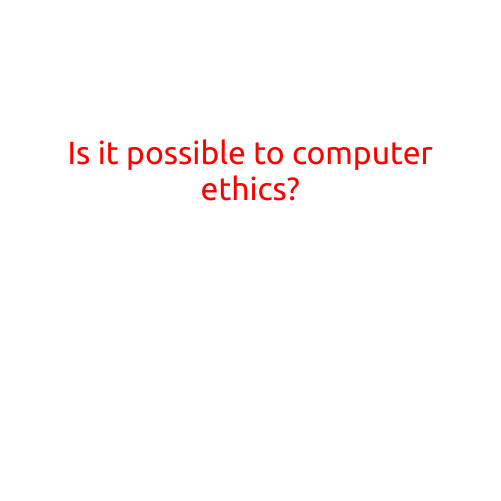
Is it possible to computer ethics?
As technology continues to advance and play an increasingly prominent role in our daily lives, the question of computer ethics has become a pressing concern. With the increasing reliance on computers and the internet, it is essential to consider the ethical implications of these technologies.
But is it even possible to have computer ethics? Can we apply traditional moral principles to the digital world? The answer is complicated, and it is essential to examine the concept of computer ethics and its limitations.
The challenges of computer ethics
Computer ethics, also known as cyberethics, is the study of the moral principles that govern the use of computers and the internet. It aims to address the ethical implications of technology on individuals, communities, and society as a whole.
The problem with computer ethics is that it is a relatively new field, and the ethical principles that govern traditional human behavior may not necessarily apply to the digital world. The rapid pace of technological change has led to a lack of clear guidelines and standards for computer ethics.
Furthermore, the digital world operates in a different realm than the physical world, where traditional moral principles were developed. In the digital world, actions can have unintended consequences, such as the spread of misinformation or the violation of privacy.
The need for a new approach
To address the challenges of computer ethics, we need a new approach that takes into account the unique characteristics of the digital world. This requires a deep understanding of the ethical implications of technology and the development of new ethical principles that are tailored to the digital environment.
One approach is to adopt a pragmatic approach to computer ethics, focusing on the consequences of actions rather than traditional moral principles. This would involve considering the potential effects of technology on individuals, communities, and society as a whole.
The role of artificial intelligence
The rise of artificial intelligence (AI) has added a new layer of complexity to the question of computer ethics. As AI systems become increasingly autonomous, it is essential to consider the ethical implications of their actions.
AI systems are not bound by the same moral principles as humans, and their decisions can have unintended consequences. Therefore, it is essential to develop ethical frameworks that guide the development and use of AI systems.
Conclusion
In conclusion, computer ethics is a complex and challenging field that requires a new approach. We must adopt a pragmatic approach that takes into account the unique characteristics of the digital world and the ethical implications of technology.
The rise of AI has added a new layer of complexity to the question of computer ethics, and it is essential to develop ethical frameworks that guide the development and use of AI systems.
Ultimately, the key to computer ethics is to consider the consequences of actions and to develop ethical principles that are tailored to the digital environment. By doing so, we can ensure that technology is used in a responsible and ethical manner that benefits society as a whole.





